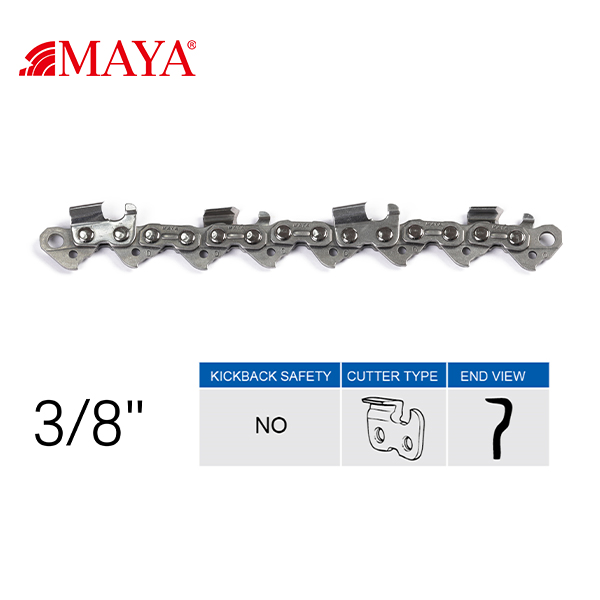Contact Us


News content

In the world of chainsaws, the materials used in guide bars and saw chains play a critical role in determining their durability, performance, and overall effectiveness. Among the key considerations are the choice between traditional steel and advanced alloy materials, each with its own unique properties and benefits. In this comprehensive guide, we'll explore the differences between steel and alloy materials for guide bars and saw chains, examining their composition, hardness, and suitability for various cutting applications.
Guide bars and saw chains are essential components of a chainsaw, working in tandem to deliver precise and efficient cutting power. The choice of materials for these components influences their strength, wear resistance, and overall performance.
Steel has been a staple material for guide bars and saw chains for decades, prized for its durability and reliability. Traditional steel guide bars and chains are typically made from high-carbon steel, which offers excellent strength and resistance to bending and deformation. These components are known for their robustness and suitability for heavy-duty cutting tasks in challenging environments.
In recent years, advances in metallurgy have led to the development of alloy materials specifically engineered for guide bars and saw chains. Alloys are metallic materials composed of two or more elements, often including elements such as chromium, nickel, and molybdenum, to enhance specific properties such as hardness, toughness, and corrosion resistance. Alloy guide bars and chains are designed to offer superior performance and longevity compared to traditional steel components.
When evaluating guide bars and saw chains, several material properties should be considered to determine their suitability for various cutting applications:
Hardness refers to the ability of a material to resist deformation or indentation under applied pressure. In guide bars and saw chains, hardness is a crucial property that directly impacts cutting performance and wear resistance. Alloy materials are renowned for their superior hardness compared to traditional steel, allowing them to maintain sharpness and cutting efficiency over extended periods of use. Harder materials also exhibit greater resistance to wear and abrasion, resulting in longer service life and reduced maintenance requirements.
Strength is another important consideration, particularly in applications involving heavy loads or high-stress conditions. Traditional steel guide bars and chains are valued for their high strength and toughness, making them well-suited for demanding cutting tasks such as felling large trees or processing hardwoods. However, alloy materials can offer comparable or even superior strength while also providing enhanced hardness and wear resistance.
Corrosion resistance is essential for guide bars and saw chains used in outdoor environments where exposure to moisture, chemicals, and other corrosive agents is common. Alloy materials, particularly those containing chromium or other corrosion-resistant elements, exhibit excellent resistance to rust and corrosion, prolonging the lifespan of the components and maintaining cutting performance in adverse conditions.
The choice between steel and alloy materials for guide bars and saw chains depends on factors such as the type of cutting tasks, frequency of use, and operating conditions:
• Heavy-Duty Cutting: For demanding applications requiring maximum strength and durability, traditional steel guide bars and chains may be preferred due to their proven performance and reliability.
• Precision Cutting: Alloy guide bars and chains, with their superior hardness and cutting efficiency, are well-suited for precision cutting tasks that demand high accuracy and consistent performance.
• Outdoor Use: In outdoor environments exposed to moisture and corrosion, alloy materials offer superior corrosion resistance, making them the preferred choice for prolonged outdoor use.
In conclusion, the choice between steel and alloy materials for guide bars and saw chains involves a careful consideration of their respective properties and suitability for specific cutting applications. While traditional steel components offer reliability and strength, alloy materials provide enhanced hardness, wear resistance, and corrosion resistance, making them ideal for demanding cutting tasks in challenging environments. By understanding the unique characteristics of each material and evaluating their performance in real-world applications, chainsaw users can make informed decisions to optimize cutting efficiency, prolong working life, and achieve superior results in their cutting endeavors. Whether it's tackling heavy-duty logging operations or precision woodworking projects, the right choice of material can make all the difference in achieving optimal performance and productivity with a chainsaw.
More
Learn essential maintenance practices for guide bars and saw chains to maximize chainsaw performance and prolong working life. Explore tips for cleaning, lubrication, tension adjustment, and rotation to optimize cutting efficiency and safety.
Discover how to enhance your chainsaw's cutting efficiency by selecting the right guide bar and saw chain. Learn about different types, maintenance tips, and key factors for optimizing performance.
Discover the differences between solid and laminated guide bars for chainsaws. Explore the pros and cons of each type and learn how to choose the right option for your cutting needs.
Looking for the perfect tool for your gardening needs? Explore our selection of mini saw chains, designed for light duty work and home gardening tasks. With options powered by electricity, batteries, or gasoline, you'll find the ideal solution for your outdoor maintenance projects.
More
Email: qirui@qiruibar.com
Tel:0086-571-82308666
Add: No. 390, Xiangdafang Industrial Park, Wenyan Street, Xiaoshan District,Hangzhou,Zhejiang,China
Website: www.qiruibar.com



Contact Us
Contact Us
